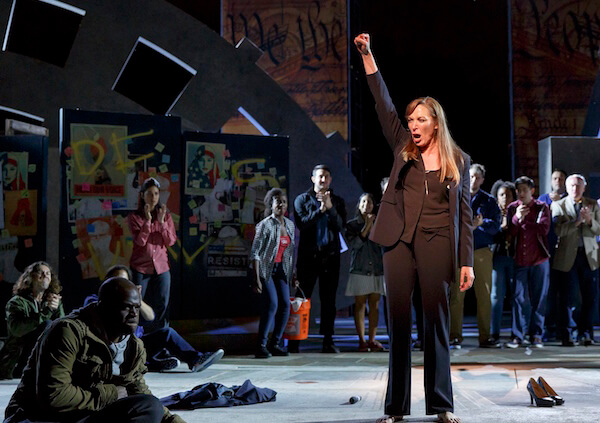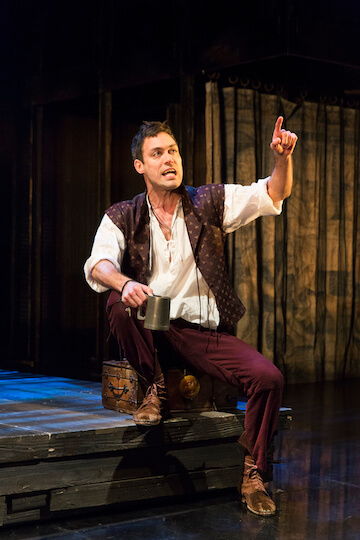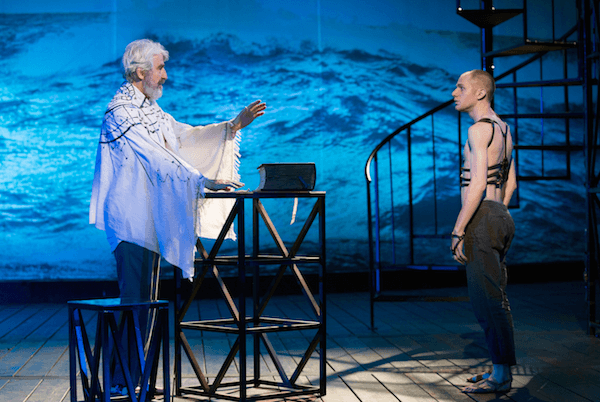Samuel Barnett as Viola and Mark Reliance as Lady Olivia in Shakespeare’s “Twelfth Night.” | JOAN MARCUS
In recent months, New York has produced a head-scratching array of shaken-up Shakespeare. A “Macbeth” set in an insane asylum featuring a single actor playing every role. A hunky Romeo in torn jeans riding a motorcycle. A “Julius Caesar” staged in a high-security women’s prison. Just to name a few.
But before you lump in the all-male “Richard III” and “Twelfth Night,” now playing in repertory at the Belasco Theatre, with the others, remember: that’s how the works were staged in Shakespeare’s day.
In fact, the many flourishes in these eloquent Shakespeare’s Globe productions, imported from London’s West End under the expert guidance of Tim Carroll, are not gimmicks at all. Rather, they’re an earnest effort to restore the works to their original experience. The results are no less than astonishing.
An accessible, giddy spin on a pair of Shakespeare classics
In addition to all parts being portrayed by men (plastered with beautifully spooky white makeup), the score is performed live by a small band playing Renaissance-era instruments in a gallery above the stage. This may well be the first time a shawm, recorder, lute, rauschpfeife, and sackbut have been showcased on Broadway. Lighting is chiefly provided by scores of wax candles in enormous chandeliers.
In perhaps a nod to the immersive theater trend invading New York these days, upon entering you can observe actors onstage conducting the ritual of putting on their costumes and makeup. The period-perfect costumes, hand-stitched using only materials available in the late 16th century, are breathtaking and well-deserving of the pre-show showcase. One night, I saw awestruck audience members being allowed to touch an actor’s sumptuous silk robes.
Two galleries flank the stage where lucky theatergoers can witness the proceedings up close and become, in effect, part of the show. The backdrop is a replica of a carved oaken screen found in an Oxford University hall, where the Bard’s works were often performed. Aside from an occasional chair, bench, table, or casket, there is no scenery, allowing the rich dialogue room to breathe. Jenny Tiramani is credited as production designer.
“Richard III” has long been hailed as one of Shakespeare’s great historical tragedies. After all, the power-crazed Duke of Gloucester leaves a bloody trail of corpses, including sundry lords, ladies, brothers, and nephews, in his path to the throne as King Richard III of England.
Good thing nobody bothered to inform British thespian Mark Rylance, for he plays the vengeful megalomaniac with a wry, devilish twist that extracts fresh bursts of comic flavor from the tragic narrative.
“Murder her brothers, and then marry her. Uncertain way of gain,” he quips, eliciting a peal of laughter from the audience. Rylance supplies Richard with the occasional manic giggle that makes his misdeeds all the more chilling.
Within this Richard, a heart does beat beneath the treachery and bombast, and his motivations are laid bare early on. A hunchback with a hideously deformed left arm, he is a misfit bullied all his life. His lust for power is only surpassed by his hunger for revenge.
Of course, we have seen magnificent scoundrels from Rylance before, like Johnny Byron in “Jerusalem” and Valere in “La Bête.” But seeing him put his tour-de-force stamp on such a dramatic icon is one of the highlights of this Broadway season. The former artistic director of Shakespeare’s Globe Theatre in London has appeared in more than 50 productions of plays by the Bard and his contemporaries.
Rylance is supported by a top-notch company that includes Angus Wright as the Duke of Buckingham, Joseph Timms as the reticent and doomed Lady Anne, Samuel Barnett as the seething Queen Elizabeth, and Kurt Egyiawan, who doubles as the Duchess of York and Richard’s foe, Richmond.
Comedy is catapulted to new heights of delirium in “Twelfth Night.” This knotty romp — featuring a young woman named Viola who dresses as a man to broker a love connection between the Duke of Orsino (Liam Brennan) and Lady Olivia — is even more delectable with a male actor (the gifted Barnett) in the role.
And while Rylance is sublime as the love-struck Olivia, he’s in plenty good company. As the boozy, buffoonish knight, Sir Andrew Aguecheek, Wright manages to be even more entertaining than the Fool (Peter Hamilton Dyer). Paul Chahidi brings a brash charm to the officious Maria, Olivia’s conniving chambermaid.
If this back-to-basics Bard ramps up the authenticity, it also enhances the intimacy and emotional impact. Besides soliloquies directed to the audience, occasionally actors interact with individual theatergoers. Somehow, we feel as if we are conspiring with the company, not simply being entertained by it. The effect is both disarmingly accessible and transporting.
RICHARD III | TWELFTH NIGHT | In repertory through Feb. 2 | Schedule at shakespearebroadway.com | Belasco Theatre, 111 W. 44th St. | $25-$137 at website or 212-239-6200


































